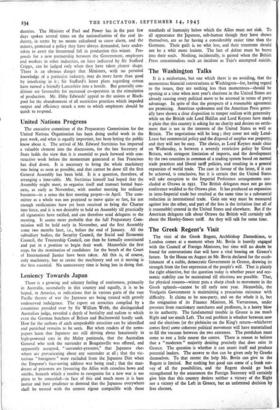The Greek Regent's Visit
The visit of the Greek Regent, Archbishop Damaskinos, to London comes at a moment when Mr. Bevin is heavily engaged with the Council of Foreign Ministers, but time will no doubt be found for conversations that will have a vital bearing on Greece's future. In the House on August 20 Mr. Bevin declared for the estab- lishment of a stable, democratic Government in Greece, drawing its strength from the free expression of the people's will. That is plainly the right objective, but the question today is whether peace and eco- nomic stability can be maintained till elections are possible. That, for physical reasons—winter puts a sharp check to movement in the Greek uplands—cannot be till early next year. Meanwhile, the Voulgaris Government is maintaining a precarious existence with difficulty. It claims to be non-party, and on the whole it is, but the resignation of its Finance Minister, M. Varvaressos, under pressure from reactionary merchants and profiteers, is a heavy blow to its authority. The fundamental trouble in Greece is too much Right and too much Left. The real problem is whether between now and the elections (or the plebiscite on the King's return—whichever comes first) some coherent political movement will have materialised to fill the vacuum between the two extremes. The pendulum must come to rest a little nearer the centre. There is reason to believe that a " moderate " majority desiring precisely that does exist in Greece. The question is whether it can assert itself and produce potential leaders. The answer to that can be given only by Greeks themselves. To that extent the help Mr. Bevin can give to the Regent is limited. But nothing but good can come of a frank sur- vey of all the possibilities, and the Regent should go back strengthened by the assurances the Foreign Secretary will certainly give him that this country desires neither a victory of the Right nor a victory of the Left in Greece, but an unfettered decision by free electors.


























 Previous page
Previous page